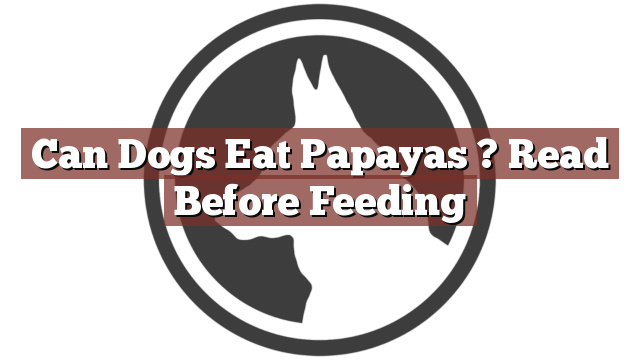Understanding Your Dog’s Dietary Needs
As a responsible dog owner, it is important to understand your furry friend’s dietary needs. Dogs require a balanced diet that provides them with all the nutrients they need to thrive. While their main source of nutrition should come from high-quality dog food, it is natural to wonder whether certain fruits and vegetables can be included in their diet. One such fruit that often raises questions is papaya. Before feeding your dog any human food, it is crucial to do your research and ensure it is safe for them to consume.
Can Dogs Eat Papayas? Read Before Feeding
Can dogs eat papayas? The answer is yes. Papayas are generally safe for dogs to eat in moderation. This tropical fruit is packed with essential vitamins like vitamin C, vitamin A, and vitamin E. It also contains dietary fiber and antioxidants, which can have numerous health benefits for your dog. However, it is important to note that not all dogs may tolerate papayas well, and some may experience digestive issues or allergies. Additionally, it is crucial to remove the seeds and skin before feeding papaya to your dog, as they can be a choking hazard or cause gastrointestinal blockages.
Pros and Cons of Feeding Papayas to Your Dog
Feeding papayas to your dog can have several potential benefits. The high vitamin content in papayas can help boost your dog’s immune system and promote healthy skin and coat. The dietary fiber in papayas can aid in digestion and prevent constipation. Furthermore, the antioxidants present in this fruit can help reduce inflammation and fight against free radicals, potentially reducing the risk of certain diseases.
However, it is essential to consider the potential drawbacks as well. Some dogs may have sensitivities or allergies to papayas, which can lead to symptoms such as vomiting, diarrhea, or itching. Additionally, papayas are high in natural sugars, so excessive consumption can lead to weight gain or other health issues, especially for dogs with diabetes or obesity. As with any new food, it is important to introduce papayas gradually into your dog’s diet and monitor their reaction.
In Conclusion: Consider Your Dog’s Individual Needs
While papayas can be a nutritious addition to your dog’s diet, it is crucial to consider their individual needs and any potential sensitivities or allergies. Before introducing any new food, it is best to consult with your veterinarian to ensure it is safe for your dog and to discuss the appropriate portion size. Remember, a balanced and complete diet, consisting mainly of high-quality dog food, is essential for your dog’s overall health and wellbeing.
Thank you for taking the time to read through our exploration of [page_title]. As every dog lover knows, our furry friends have unique dietary needs and responses, often varying from one canine to another. This is why it's paramount to approach any changes in their diet with caution and knowledge.
Before introducing any new treats or making alterations to your dog's diet based on our insights, it's crucial to consult with a veterinarian about [page_title]. Their expertise ensures that the choices you make are well-suited to your particular pet's health and well-being.
Even seemingly harmless foods can sometimes lead to allergic reactions or digestive issues, which is why monitoring your dog after introducing any new food item is essential.
The content provided here on [page_title] is crafted with care, thorough research, and a genuine love for dogs. Nevertheless, it serves as a general guideline and should not be considered a substitute for professional veterinary advice.
Always prioritize the expert insights of your veterinarian, and remember that the health and happiness of your furry companion come first.
May your journey with your pet continue to be filled with joy, love, and safe culinary adventures. Happy reading, and even happier snacking for your canine friend!

